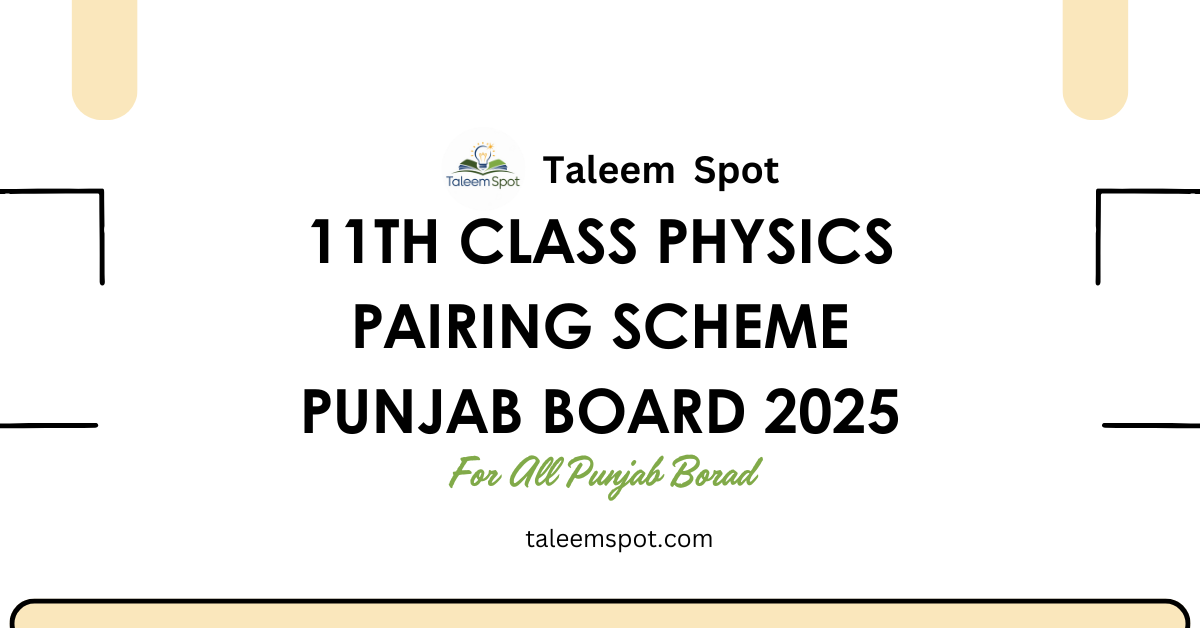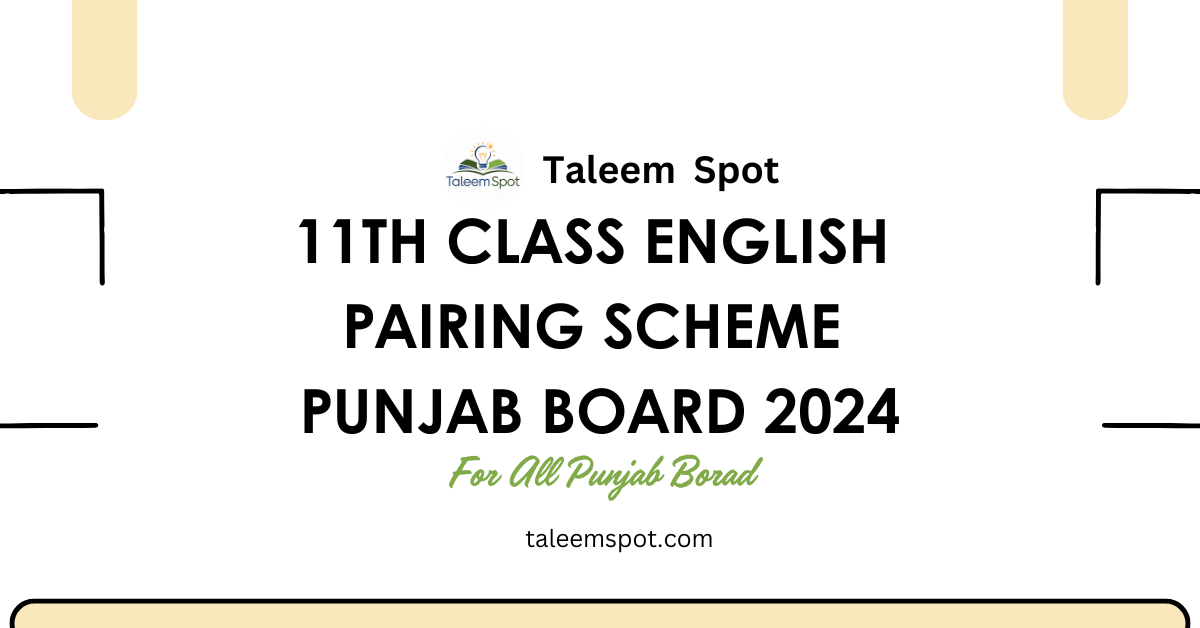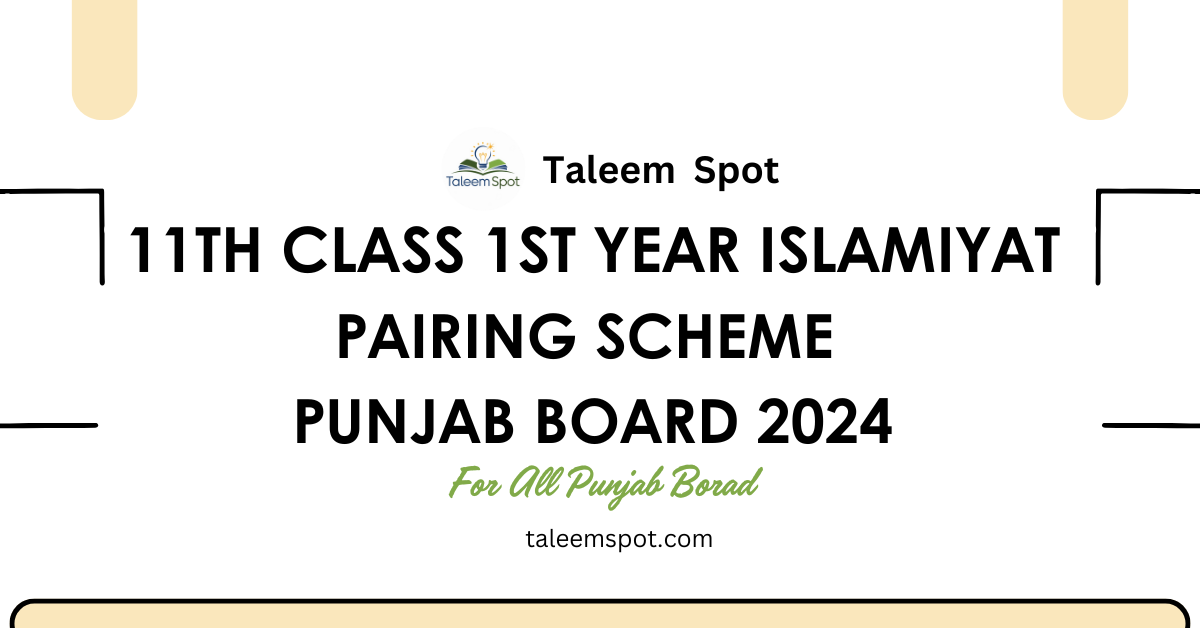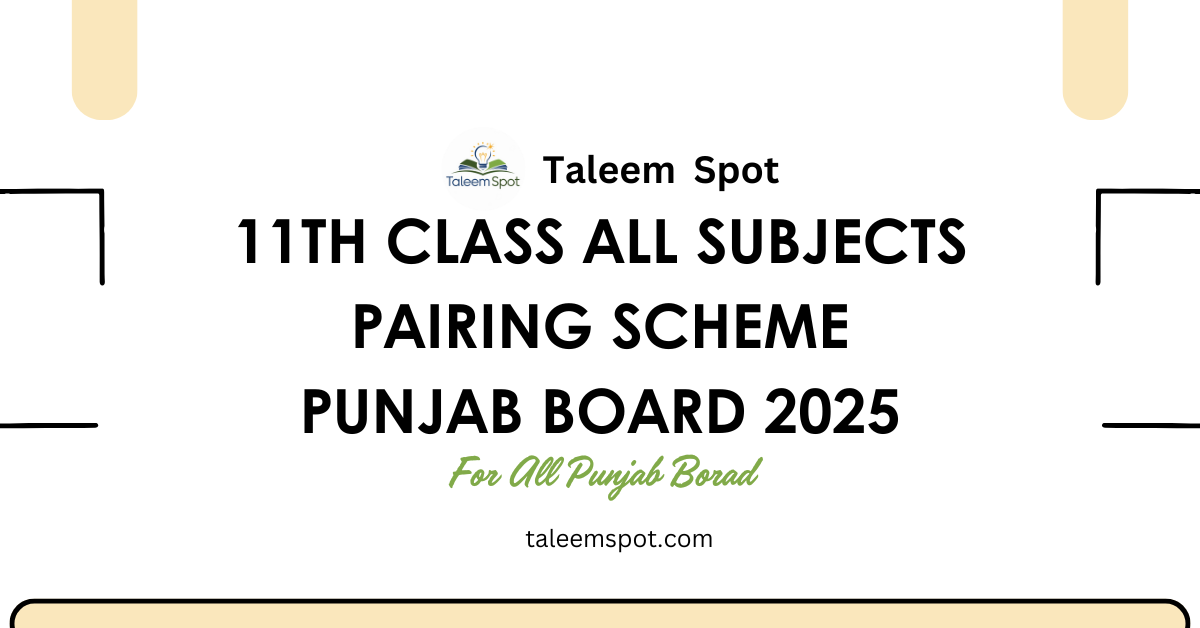11th Class Computer Science Pairing Scheme Punjab Board 2025
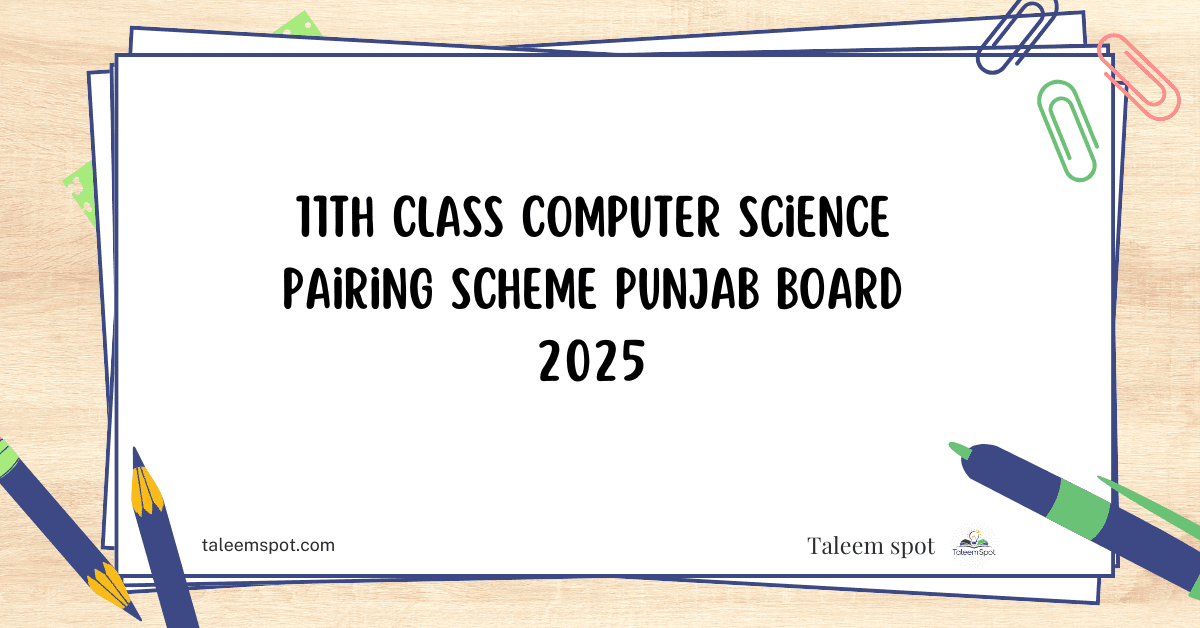
The 11th Class Computer Science Pairing Scheme Punjab Board 2025 is a must-have resource for students preparing for their board exams. This pairing scheme provides detailed insights into how questions are distributed across the syllabus, allowing students to focus on key chapters and topics. Designed for all Punjab Boards, including Lahore, Rawalpindi, Multan, Gujranwala, Faisalabad, Bahawalpur, Sahiwal, Sargodha, and Dera Ghazi Khan, it ensures that students can plan their studies strategically to maximize their scores.
Computer Science in 11th grade combines theoretical concepts and practical problem-solving. This pairing scheme highlights how different topics are paired for long and short questions, guiding students to achieve better results with focused preparation.
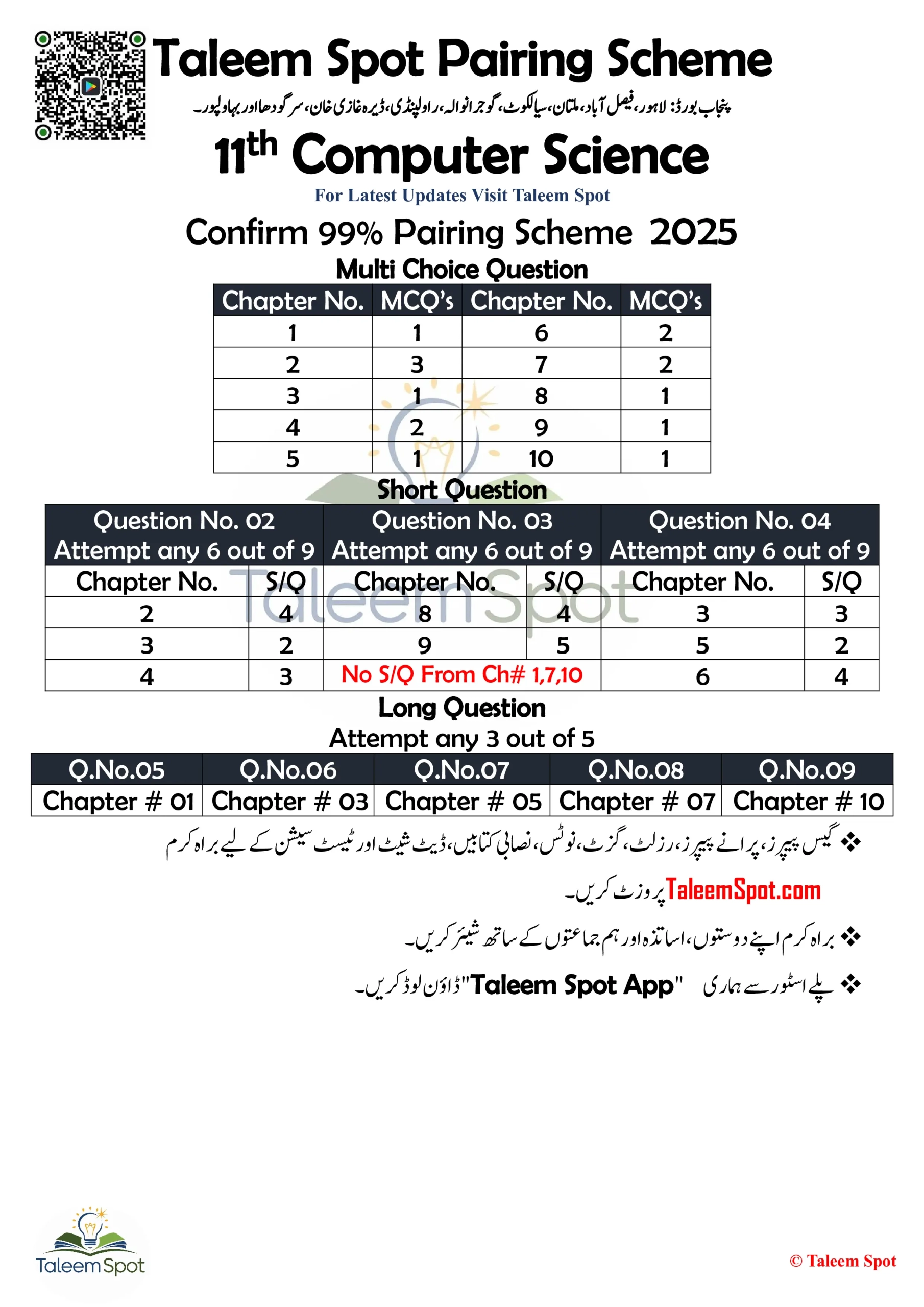
All Subjects Pairing Scheme : Visit Here
What Is the 11th Class Computer Science Pairing Scheme?
The 11th Class Computer Science Pairing Scheme Punjab Board 2025 outlines the distribution of questions into various sections such as MCQs, short questions, and long questions. It pairs chapters to help students understand the exam pattern and prioritize their preparation effectively.
Key Features of the Pairing Scheme
- Chapter Pairings for Long Questions: Indicates which chapters are combined for long questions.
- Short Question Distribution: Highlights chapters with a higher number of short questions.
- MCQ Emphasis: Identifies chapters commonly tested in the MCQ section.
- Balanced Study Plan: Helps students allocate their time according to the weightage of each chapter.
Benefits of the 11th Class Computer Science Pairing Scheme Punjab Board 2025
1. Focused Preparation
By using the pairing scheme, students can focus their preparation on high-priority chapters, such as programming fundamentals, data types, and flowcharts, ensuring they cover the most critical topics.
2. Reduces Exam Stress
Understanding the exam structure in advance helps reduce stress. Students can prepare with confidence, knowing which chapters to prioritize for each section of the paper.
3. Saves Time
The pairing scheme identifies key chapters for long and short questions, allowing students to allocate their study time effectively without wasting effort on less critical areas.
4. Universal Applicability
Whether you belong to Lahore, Rawalpindi, or Multan Boards, this pairing scheme is applicable to all Punjab Boards, making it a reliable resource for every student.
5. Boosts Scoring Potential
By focusing on the paired chapters and practicing the specific question patterns, students can maximize their scoring potential in both theoretical and practical sections.
Effective Preparation Strategies with the Pairing Scheme
1. Understand Long Question Pairings
The 11th Class Computer Science Pairing Scheme Punjab Board 2025 specifies how chapters are paired for long questions. For example, if “Chapter 1: Basics of Information Technology” is paired with “Chapter 4: Fundamentals of Algorithms,” students should prioritize these chapters for detailed preparation.
2. Practice Short Questions Regularly
Short questions test fundamental knowledge. Use the pairing scheme to identify chapters with a higher likelihood of appearing in the short question section and revise these topics consistently.
3. Focus on MCQs
MCQs are a vital part of the exam and often test precise knowledge. Chapters such as “Data Types” and “Input/Output Devices” frequently contribute to the MCQ section.
4. Allocate Study Time Strategically
Divide your study time based on the pairing scheme. Spend more time on chapters paired for long questions and review frequently tested topics for MCQs and short questions.
5. Combine the Pairing Scheme with Practical Exercises
For Computer Science, practical knowledge is as important as theory. Pair theoretical study with hands-on practice, such as solving programming problems and creating flowcharts.
Subjects and Topics Covered in the Pairing Scheme
The 11th Class Computer Science Pairing Scheme Punjab Board 2025 includes all major topics in the syllabus:
- Basics of Information Technology: Focus on concepts like hardware, software, and types of computers.
- Data Representation: Covers binary systems, number conversions, and storage mechanisms.
- Data Types and Variables: Explanation of various data types, variables, and constants.
- Input/Output Devices: Highlights devices used for data input and output.
- Programming Fundamentals: Emphasis on flowcharts, algorithms, and pseudocode.
- Problem Solving: Includes techniques and logical structures for programming.
- System Components: Details about the CPU, memory, and storage units.
These topics are strategically paired in the scheme to ensure comprehensive preparation.
Region-Specific Highlights
This pairing scheme is tailored to meet the needs of students from all Punjab Boards:
- Lahore Board: Focuses on programming fundamentals and algorithms.
- Rawalpindi Board: Highlights binary systems and data representation.
- Multan Board: Prioritizes input/output devices and system components.
- Gujranwala Board: Emphasizes flowcharts and problem-solving techniques.
- Faisalabad Board: Covers data types, variables, and pseudocode.
- Bahawalpur Board: Focuses on logical structures and algorithm development.
- Sahiwal Board: Includes binary conversions and data storage mechanisms.
- Sargodha Board: Highlights the importance of hardware components and their functions.
- Dera Ghazi Khan Board: Covers key MCQs from programming and data types.
Findings
The 11th Class Computer Science Pairing Scheme Punjab Board 2025 is an invaluable tool for students looking to excel in their exams. By providing a clear structure for question distribution, it helps students streamline their preparation, save time, and focus on critical areas.
This pairing scheme ensures that students from all Punjab Boards have the resources they need to succeed in Computer Science exams. When paired with consistent practice and thorough revision, it becomes a powerful guide for achieving high scores.
FAQs
1. What is the 11th Class Computer Science Pairing Scheme?
The pairing scheme outlines the distribution of MCQs, short questions, and long questions across the Computer Science syllabus.
2. Is this pairing scheme applicable to all Punjab Boards?
Yes, it is valid for Lahore, Rawalpindi, Multan, Gujranwala, Faisalabad, Bahawalpur, Sahiwal, Sargodha, and Dera Ghazi Khan Boards.
3. How does the pairing scheme help in preparation?
It helps students focus on paired chapters for long and short questions, saving time and ensuring strategic preparation.
4. What chapters are covered in the pairing scheme?
Key chapters include “Basics of Information Technology,” “Programming Fundamentals,” and “Data Representation.”
5. Does the pairing scheme include MCQs?
Yes, it highlights chapters frequently tested in the MCQ section, such as “Data Types” and “Input/Output Devices.”
6. Can this pairing scheme guarantee better marks?
While it improves preparation efficiency, achieving high marks also depends on regular practice and understanding the syllabus.
7. Where can I access the pairing scheme?
The pairing scheme is available for free on educational platforms like TaleemSpot.com.
8. Should I combine the pairing scheme with practical exercises?
Yes, pairing theoretical study with hands-on programming and flowchart practice is essential for success.
9. Are short questions included in the pairing scheme?
Yes, the scheme specifies chapters that are likely to appear in the short question section.
10. How often should students revise using the pairing scheme?
Students should revise paired chapters regularly, focusing on both long and short questions for effective preparation.

